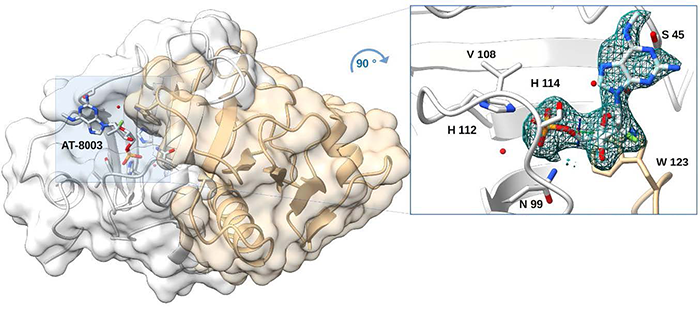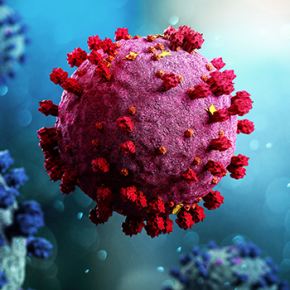
Covid-19 and hepatitis C: a key discovery for effective drug treatments
Scientists have deciphered the activation pathway of bemnifosbuvir1 , a drug candidate initially in development to treat hepatitis C virus (HCV). The findings of the research team, led by CNRS scientists2 , unlock new opportunities to boost the efficacy of this type of drug against other RNA viruses, such as the ones that cause Covid-19 and dengue fever.
When taken in pill form, bemnifosbuvir – like all antivirals in the same family3 – must undergo a series of changes inside infected cells before it acquires the form needed to prevent a virus from multiplying4 . Scientists have discovered that five different enzymes drive this series of changes. They used X-ray crystallization techniques to study the three-dimensional structure of these enzymes and their surfaces interacting with the drug. Scientists also converged to the chemical parts in bemnifosbuvir behind its enhanced efficacy in liver cells. This discovery is a step towards improving the drug potency in other infected organs, such as the lungs in the case of Covid-19.
The findings, published in PLOS Biology on 27 August, are expected to expand control over the nucleotide analogue activation pathway and encourage the development of novel compounds expanding effectiveness against other RNA viruses. Similarly, it will facilitate accurate prediction of which cell-type activate which antiviral drug candidate. Scientists can also use this new knowledge to limit clinical trials to animal models that in fact have the enzymes needed to activate this type of drug.

A bemnifosbuvir molecule undergoing activation in AT-8003 form (enlargement in the box on the right), depicted using coloured sticks. It is seen here interacting with ‘HINT1’, a human enzyme that increases the drug’s effectiveness in the liver.
© François Ferron/Canard et al./PLOS Biology
- 1Bemnifosbuvir is a molecule developed by the American company Atea Pharmaceuticals. Initially in development to fight the HCV virus that causes hepatitis C, the drug candidate was also found to be active against SARS-CoV-2, the virus that causes Covid-19. Bemnifosbuvir is currently in Phase 2 development for HCV and Phase 3 development for COVID-19.
- 2Working at the Architecture et Fonction des Macromolécules Biologiques (AFMB) laboratory at Aix-Marseille Université/CNRS.
- 3Bemnifosbuvir is an analogue of guanosine, a component of RNA needed for a virus to replicate in an infected organism.
- 4As an analogue of guanosine, activated bemnifosbuvir is recognised and incorporated into a virus’s genetic material by its own replication machinery. A ‘defect’ in the analogue, however, unlike the natural molecule, prevents the virus from replicating. Bemnifosbuvir’s mechanism of action against SARS-CoV-2 is described in detail by the same team in the following study: A dual mechanism of action of AT-527 against SARS-CoV-2 polymerase, Nature Communications, February 2, 2022.
The activation cascade of the broad-spectrum antiviral bemnifosbuvir characterized at atomic resolution. Aurélie Chazot, Claire Zimberger, Mikael Feracci, Adel Moussa, Steven Good, Jean-Pierre Sommadossi, Karine Alvarez, François Ferron and Bruno Canard. PLOS Biology, 27 August 2024.
DOI : https://doi.org/10.1371/journal.pbio.3002743


